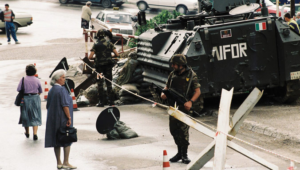BY JENNIFER KELTZ
Just because two officers are fighting for the same cause does not mean that they will work together.

NATO’s Implementation Force. Source: NATO Press Release, Dec 18, 2015.
As a boy in New York, John Gentry never pictured that he would one day spend over twenty years as an officer in the US Army Reserves. He certainly never thought that he would find himself caught in cross-hairs of interservice parochialism in Bosnia. However, that is exactly where he found himself in 1996.
Gentry said that his difficulties dealing with American, British, and NATO forces in Bosnia were an extreme example of interservice rivalry, but parochialism affects organizational efficacy all the time. While he was able to overcome the rivalry and do his job, it can sometimes lead to severe consequences for troops and their missions.
Gentry, a quiet, thoughtful professor at Columbia University, retired from his position as a US Army Lieutenant Colonel years ago. When he was young, he had no intentions of joining the military, but he was draft number 16 in the later days of the United States’ Vietnam-era conscription. “To avoid the draft, I enlisted in the Army, with the provision that I go to infantry officer candidate school (OCS),” he said.
He had just finished his undergraduate degree at the University of North Carolina – Chapel Hill, when he went to OCS. He graduated from OCS in 1972, went through a special forces course, and was deployed to Okinawa, avoiding the Vietnam War completely. When his three-year active duty commitment ended, he became an officer in the Army Reserves. When his three-year Reserve commitment ended, he decided to stay in.
Eventually, he switched from infantry to intelligence. In his civilian life, he started working at the Central Intelligence Agency as an analyst focusing on the Soviet Union and Eastern Europe, so his transition to Army intelligence felt natural.
Intelligence led to Civil Affairs. After three years as a Civil Affairs officer, Gentry was sent to Bosnia in 1996 with NATO to replace the United Nations PROFOR mission. NATO’s role was to help enforce the peace agreement signed in Dayton in the fall of 1995 that brought the Bosnian War to a close.
As a Civil Affairs officer on a peacekeeping mission, he was in Bosnia to aid collaboration between NATO countries, the local government, and non-governmental organizations. He was assigned to work at the NATO Implementation Force (IFOR) headquarters, and then five months later was sent to NATO’s Supreme Headquarters Allied Powers Europe (SHAPE) in Belgium.
At SHAPE, Gentry planned NATO’s next steps as the US Army prepared to take over the IFOR command. It was here that he dealt with the effects of strong parochialism. When he asked his friends at the IFOR headquarters for help, they refused to give him the information they requested. While he could not discuss the nature of the information itself, he said that he needed it for Army planning purposes.
“‘You’re at the higher headquarters,’” they said to Gentry, “‘and we work for you, but this is our turf, so we’re going to control it ourselves and not cooperate.’”
He had to get a letter of authorization from a US Air Force Lieutenant General, authorizing him to receive answers to his questions. He went to a British officer he knew at the IFOR Command and presented his authorization letter. “I felt like a plenipotentiary going to see some king,” Gentry said.
After presenting the letter, his friends told him everything he needed to know, but as he left, they warned him that “‘as soon as you leave, we’re not going to tell you anything at all.’”
He was able to get his job done, but for the rest of the five months he was there, Gentry said that he avoided working with his former colleagues so as to not have to repeat the process. He said that he may have produced better results on later missions with their help, but that he was unwilling to repeat the experience.
Gentry said that this was an extreme case of parochialism, but that it exemplifies a larger problem in the military. Unit commanders are assigned to do a specific job and view themselves as the ultimate authority on that task, refusing to recognize the rank authority of anyone above them who tries to tell them what to do. This is irrespective of prior relationships, and Gentry said that his experience had nothing to d
o with him personally.
He said that “the idea that the people on the ground are in charge and everybody else is an outsider whose role is to get out of the way” is standard.
He was fortunate that he was able to get the information that he needed, but stories of interservice rivalry do not always have happy endings. Parochialism within the US military, can have life-threatening consequences, as it did in 1983 when Navy officers refused to allow Army rescue helicopters evacuating troops wounded in Grenada to land on their ships. The Navy officers reasoned that their refusal was warranted, given that the Army pilots were not trained on Navy flight protocol.
Ultimately, interservice rivalry, both within the US services and across services in NATO, is a product of the self-serving nature of bureaucracy. “If you’re a good bureaucrat, civilian or military, what’s the highest goal?” Gentry asked. “It’s to protect and advance your organization’s interests. If the national interest is consistent with that, that’s fine. If not, organizational interest comes first.”
When that’s the case, missions can falter and fail.